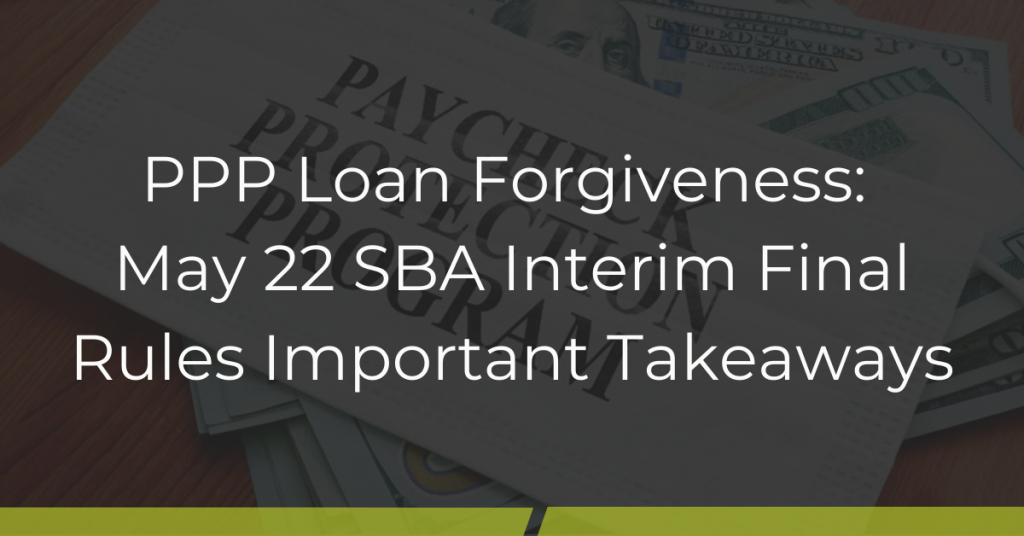PPP Loan Forgiveness: May 22 SBA Interim Final Rules Important Takeaways

By: Logan Wood © 2020
The CARES Act is an overarching Act aimed to help those affected by COVID-19. In particular, this Act authorized the United States Small Business Administration (“SBA”) to provide temporary guaranteed loans under a program known as the Paycheck Protection Program (“PPP”). In general, the Act allowed certain borrowers to be eligible for forgiveness of their PPP loan. This forgiveness was limited to the number of certain payments made throughout the covered period. Because the program is a first of its kind, not all questions were answered through the initial draft.
To address this issue, the SBA through their Interim Final Rules (“IFR”), have from time to time provided guidance and clarification on certain areas of interest. On May 22, the SBA released their IRF specifically on Loan Forgiveness under the PPP. Below are some of the major takeaways from the most recent IFR.
Before looking into the important takeaways, it is worth noting that the IFR repeatedly refers to these “rules” as guidance as the IFR is not precise legal advice. Further, it is worth recognizing that each borrower may have a unique set of circumstances that warrants independent review and analysis of their facts in order to make a fact-specific determination.
Audits:
- The IFR notes that the SBA will audit all PPP loans over $2 million dollars and has the authority to review any loan disbursed, regardless of amount. While the full scope of the audit has not been outlined, it is clear that it will include a review of eligibility, loan amount, use of proceeds and forgiveness amount. Borrowers must keep documentation throughout this process and must maintain the documents for six (6) years. During an audit, a borrower can respond to questions. Additionally, a borrower can appeal if they are found to have been ineligible for a PPP loan.
Eligible Employees:
-
- All employees are to be counted, even those that are foreign employees. The loan forgiveness process will include verifying the number of employees at the time of the application and the number of employees at the time of requesting loan forgiveness. Discrepancies between the two dates could result in a decreased amount of loan forgiveness.
Bonuses and Hazard Pay:
-
-
- Bonuses and hazard pay are eligible for forgiveness. However, the total amount each employee may receive is subject to limitations.
- One question that still requires clarification are yearend bonuses that are paid early. Because yearend bonuses typically occur at the end of the year, paying such a bonus between February 12, 2020 and June 30, 2020 might not be considered as an expense incurred in the normal course of business.
-
Tips:
-
- A concern for certain borrowers is what to do about tips paid by customers. The IFR included cash tips or their equivalent. This amount is to be based on employer records, or in the absence of such records, should be based on a reasonable and good-faith estimate.
Employees Who Refuse Rehire:
-
- If an employee refuses to return after being rehired, there must be documentation of the offer of rehire by the employer and the refusal of rehire by the employee. This can be difficult if the employee refuses to respond. In each situation, it is paramount to document all actions taken. Additionally, it is helpful to have witnesses to the offer and to the refusal by the employee to corroborate the history.
Time Period of Forgiveness:
-
-
- Section 1102 provides the period for allowable uses as February 15, 2020 to June 30, 2020. However, it is possible to receive forgiveness for expenses that extend beyond June 30, 2020 provided that these expenses are conducted through the normal course of business.
- An example of this would be a rent payment that is regularly made in advance for the next month
-
For a review of all information contained in the IFR, please visit https://home.treasury.gov/system/files/136/PPP-IFR-Loan-Forgiveness.pdf .
If you would like more information about your circumstances or any specific questions you may have, please feel free to reach out to any of the Attorneys at Steimle Birschbach, LLC by visiting us at our website. Our Manitowoc office phone number is (920) 683-3500 and Sheboygan’s office phone number is (920) 395-2028.
The post PPP Loan Forgiveness: May 22 SBA Interim Final Rules Important Takeaways appeared first on Steimle Birschbach, LLC.








